Self-Driving Car Crashes: An Ethical Analysis of Responsibility
VerifiedAdded on 2021/06/16
|6
|1741
|30
Essay
AI Summary
This essay delves into the ethical considerations surrounding self-driving car accidents, focusing on a case study involving a crash by a Google self-driving car. The essay applies four classical ethical theories—utilitarianism, deontology, virtue ethics, and contract theory—to assess responsibility and the ethical implications of such incidents. It explores how each theory provides a framework for evaluating the actions of developers, manufacturers, and the technology itself. The analysis considers the benefits and drawbacks of self-driving car technology, the importance of thorough testing, and the societal impacts of autonomous vehicles. The essay concludes that ethical considerations must be at the forefront of technological advancements to ensure safety and accountability.
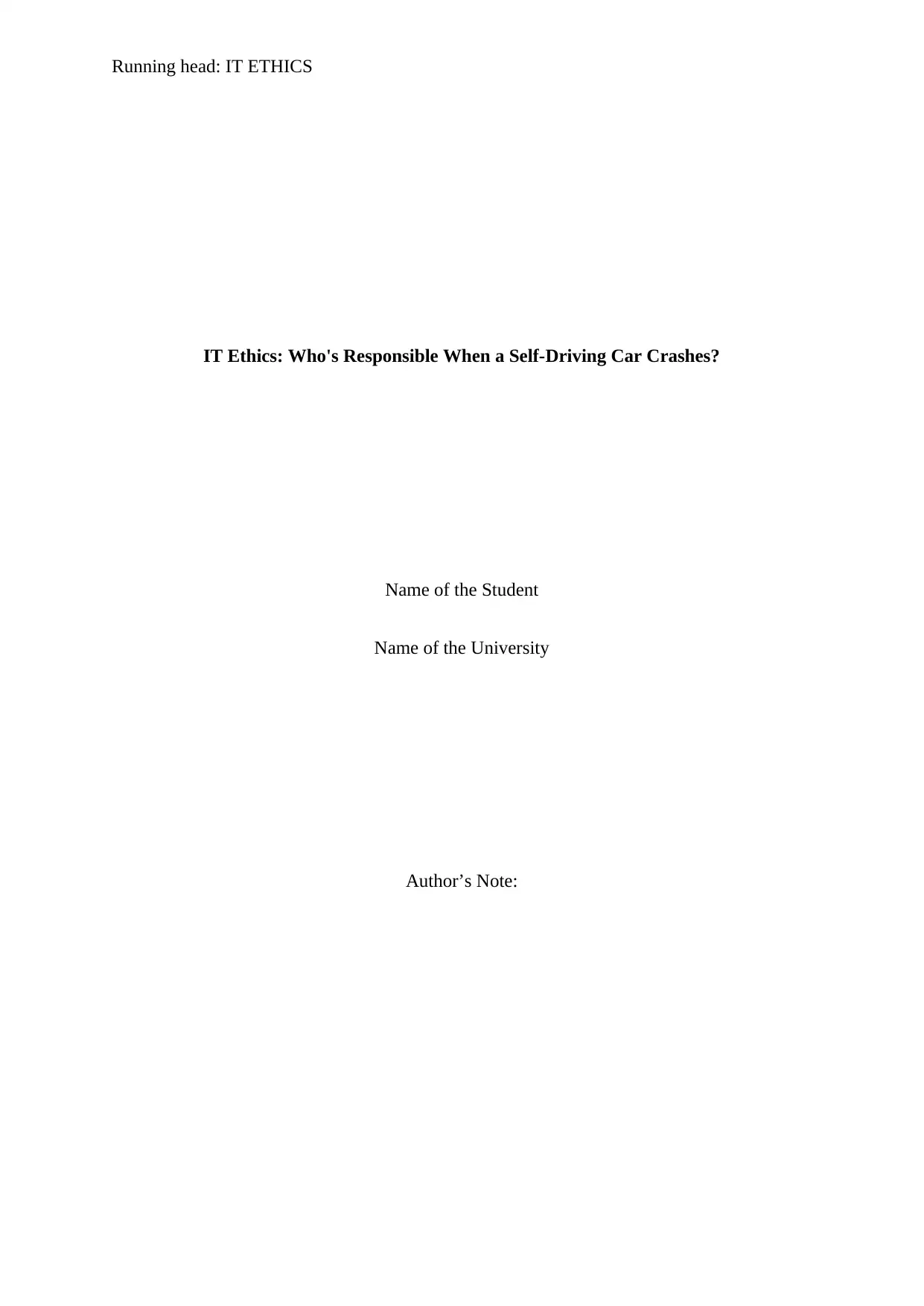
Running head: IT ETHICS
IT Ethics: Who's Responsible When a Self-Driving Car Crashes?
Name of the Student
Name of the University
Author’s Note:
IT Ethics: Who's Responsible When a Self-Driving Car Crashes?
Name of the Student
Name of the University
Author’s Note:
Paraphrase This Document
Need a fresh take? Get an instant paraphrase of this document with our AI Paraphraser
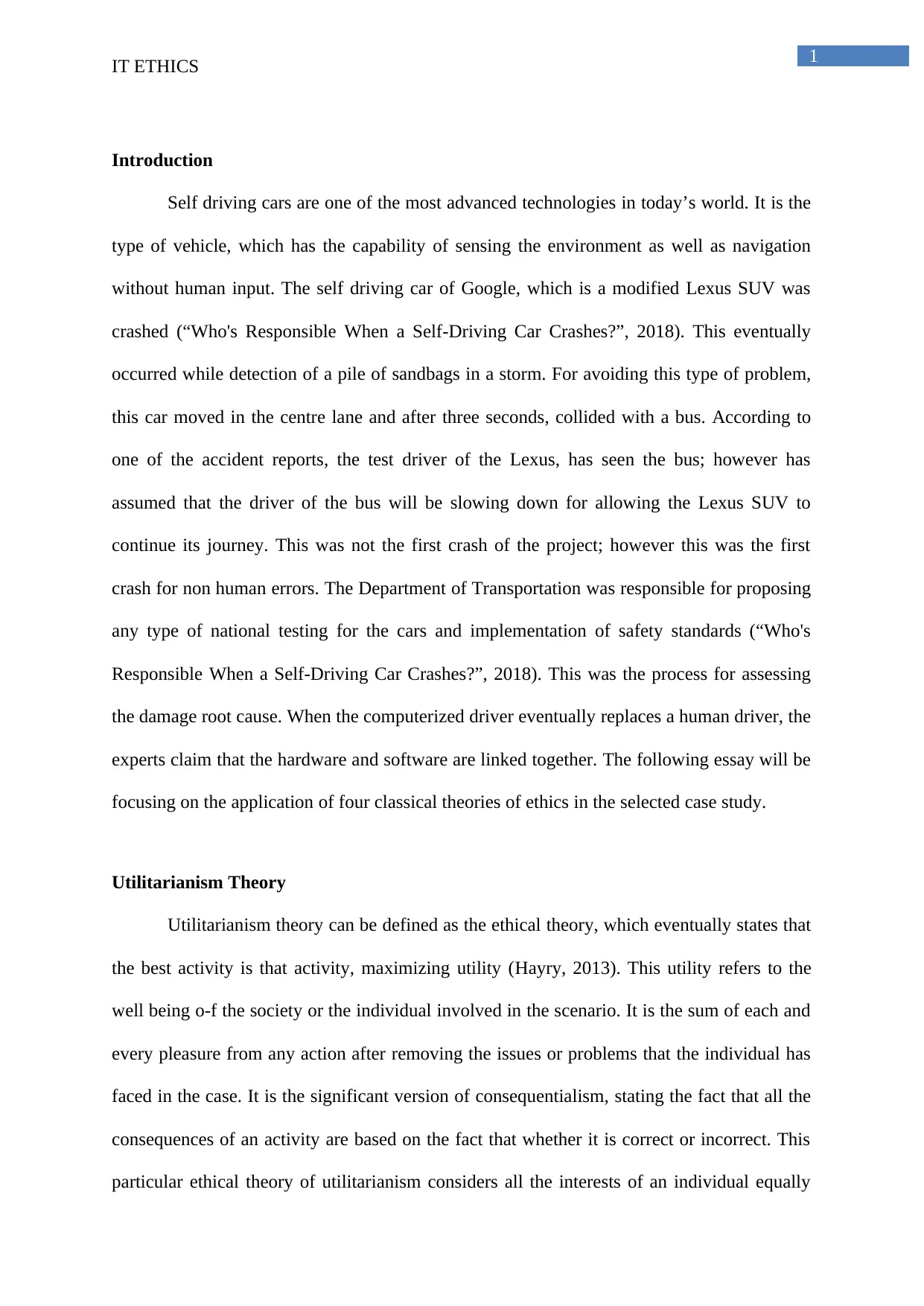
1
IT ETHICS
Introduction
Self driving cars are one of the most advanced technologies in today’s world. It is the
type of vehicle, which has the capability of sensing the environment as well as navigation
without human input. The self driving car of Google, which is a modified Lexus SUV was
crashed (“Who's Responsible When a Self-Driving Car Crashes?”, 2018). This eventually
occurred while detection of a pile of sandbags in a storm. For avoiding this type of problem,
this car moved in the centre lane and after three seconds, collided with a bus. According to
one of the accident reports, the test driver of the Lexus, has seen the bus; however has
assumed that the driver of the bus will be slowing down for allowing the Lexus SUV to
continue its journey. This was not the first crash of the project; however this was the first
crash for non human errors. The Department of Transportation was responsible for proposing
any type of national testing for the cars and implementation of safety standards (“Who's
Responsible When a Self-Driving Car Crashes?”, 2018). This was the process for assessing
the damage root cause. When the computerized driver eventually replaces a human driver, the
experts claim that the hardware and software are linked together. The following essay will be
focusing on the application of four classical theories of ethics in the selected case study.
Utilitarianism Theory
Utilitarianism theory can be defined as the ethical theory, which eventually states that
the best activity is that activity, maximizing utility (Hayry, 2013). This utility refers to the
well being o-f the society or the individual involved in the scenario. It is the sum of each and
every pleasure from any action after removing the issues or problems that the individual has
faced in the case. It is the significant version of consequentialism, stating the fact that all the
consequences of an activity are based on the fact that whether it is correct or incorrect. This
particular ethical theory of utilitarianism considers all the interests of an individual equally
IT ETHICS
Introduction
Self driving cars are one of the most advanced technologies in today’s world. It is the
type of vehicle, which has the capability of sensing the environment as well as navigation
without human input. The self driving car of Google, which is a modified Lexus SUV was
crashed (“Who's Responsible When a Self-Driving Car Crashes?”, 2018). This eventually
occurred while detection of a pile of sandbags in a storm. For avoiding this type of problem,
this car moved in the centre lane and after three seconds, collided with a bus. According to
one of the accident reports, the test driver of the Lexus, has seen the bus; however has
assumed that the driver of the bus will be slowing down for allowing the Lexus SUV to
continue its journey. This was not the first crash of the project; however this was the first
crash for non human errors. The Department of Transportation was responsible for proposing
any type of national testing for the cars and implementation of safety standards (“Who's
Responsible When a Self-Driving Car Crashes?”, 2018). This was the process for assessing
the damage root cause. When the computerized driver eventually replaces a human driver, the
experts claim that the hardware and software are linked together. The following essay will be
focusing on the application of four classical theories of ethics in the selected case study.
Utilitarianism Theory
Utilitarianism theory can be defined as the ethical theory, which eventually states that
the best activity is that activity, maximizing utility (Hayry, 2013). This utility refers to the
well being o-f the society or the individual involved in the scenario. It is the sum of each and
every pleasure from any action after removing the issues or problems that the individual has
faced in the case. It is the significant version of consequentialism, stating the fact that all the
consequences of an activity are based on the fact that whether it is correct or incorrect. This
particular ethical theory of utilitarianism considers all the interests of an individual equally
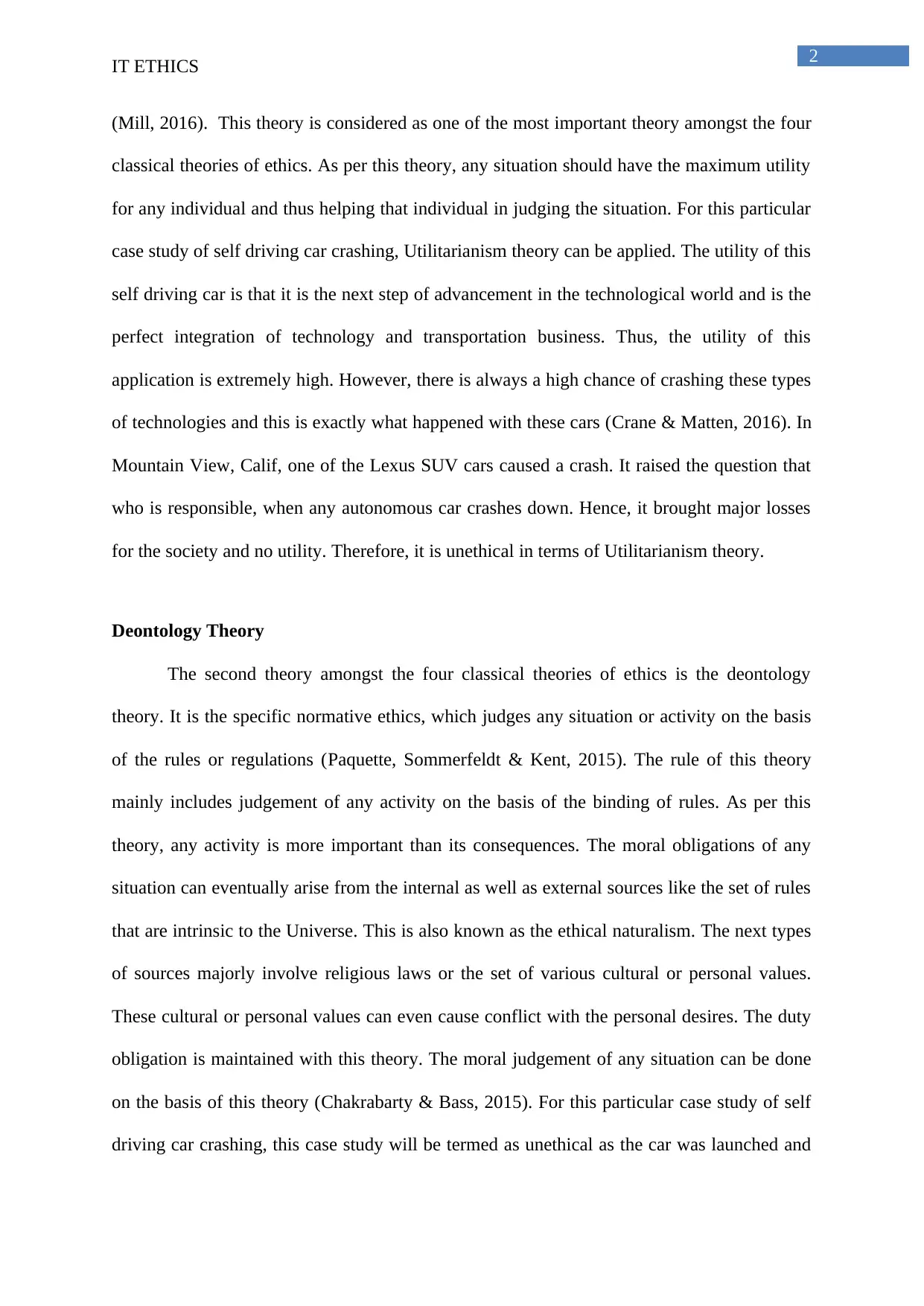
2
IT ETHICS
(Mill, 2016). This theory is considered as one of the most important theory amongst the four
classical theories of ethics. As per this theory, any situation should have the maximum utility
for any individual and thus helping that individual in judging the situation. For this particular
case study of self driving car crashing, Utilitarianism theory can be applied. The utility of this
self driving car is that it is the next step of advancement in the technological world and is the
perfect integration of technology and transportation business. Thus, the utility of this
application is extremely high. However, there is always a high chance of crashing these types
of technologies and this is exactly what happened with these cars (Crane & Matten, 2016). In
Mountain View, Calif, one of the Lexus SUV cars caused a crash. It raised the question that
who is responsible, when any autonomous car crashes down. Hence, it brought major losses
for the society and no utility. Therefore, it is unethical in terms of Utilitarianism theory.
Deontology Theory
The second theory amongst the four classical theories of ethics is the deontology
theory. It is the specific normative ethics, which judges any situation or activity on the basis
of the rules or regulations (Paquette, Sommerfeldt & Kent, 2015). The rule of this theory
mainly includes judgement of any activity on the basis of the binding of rules. As per this
theory, any activity is more important than its consequences. The moral obligations of any
situation can eventually arise from the internal as well as external sources like the set of rules
that are intrinsic to the Universe. This is also known as the ethical naturalism. The next types
of sources majorly involve religious laws or the set of various cultural or personal values.
These cultural or personal values can even cause conflict with the personal desires. The duty
obligation is maintained with this theory. The moral judgement of any situation can be done
on the basis of this theory (Chakrabarty & Bass, 2015). For this particular case study of self
driving car crashing, this case study will be termed as unethical as the car was launched and
IT ETHICS
(Mill, 2016). This theory is considered as one of the most important theory amongst the four
classical theories of ethics. As per this theory, any situation should have the maximum utility
for any individual and thus helping that individual in judging the situation. For this particular
case study of self driving car crashing, Utilitarianism theory can be applied. The utility of this
self driving car is that it is the next step of advancement in the technological world and is the
perfect integration of technology and transportation business. Thus, the utility of this
application is extremely high. However, there is always a high chance of crashing these types
of technologies and this is exactly what happened with these cars (Crane & Matten, 2016). In
Mountain View, Calif, one of the Lexus SUV cars caused a crash. It raised the question that
who is responsible, when any autonomous car crashes down. Hence, it brought major losses
for the society and no utility. Therefore, it is unethical in terms of Utilitarianism theory.
Deontology Theory
The second theory amongst the four classical theories of ethics is the deontology
theory. It is the specific normative ethics, which judges any situation or activity on the basis
of the rules or regulations (Paquette, Sommerfeldt & Kent, 2015). The rule of this theory
mainly includes judgement of any activity on the basis of the binding of rules. As per this
theory, any activity is more important than its consequences. The moral obligations of any
situation can eventually arise from the internal as well as external sources like the set of rules
that are intrinsic to the Universe. This is also known as the ethical naturalism. The next types
of sources majorly involve religious laws or the set of various cultural or personal values.
These cultural or personal values can even cause conflict with the personal desires. The duty
obligation is maintained with this theory. The moral judgement of any situation can be done
on the basis of this theory (Chakrabarty & Bass, 2015). For this particular case study of self
driving car crashing, this case study will be termed as unethical as the car was launched and
⊘ This is a preview!⊘
Do you want full access?
Subscribe today to unlock all pages.

Trusted by 1+ million students worldwide
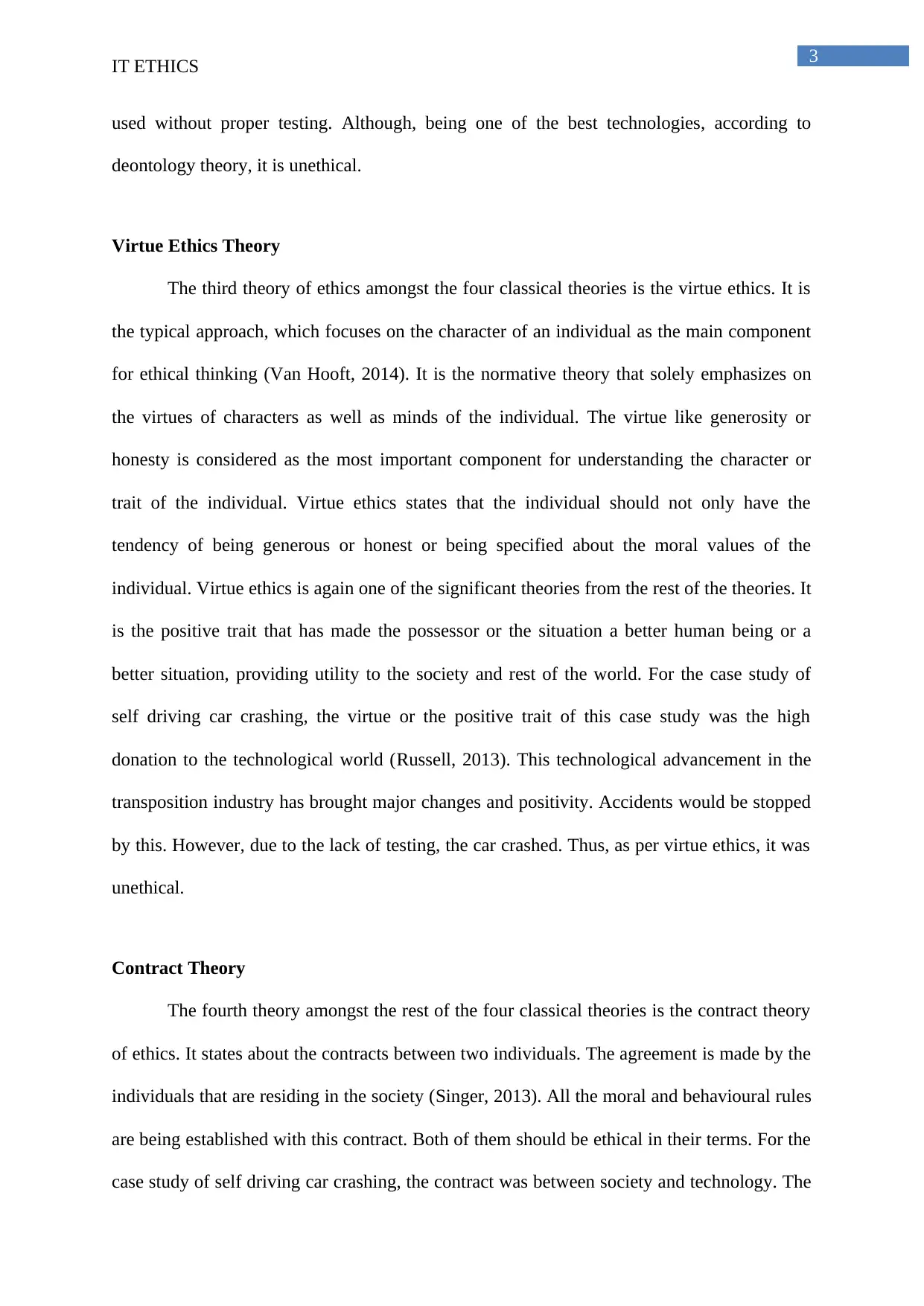
3
IT ETHICS
used without proper testing. Although, being one of the best technologies, according to
deontology theory, it is unethical.
Virtue Ethics Theory
The third theory of ethics amongst the four classical theories is the virtue ethics. It is
the typical approach, which focuses on the character of an individual as the main component
for ethical thinking (Van Hooft, 2014). It is the normative theory that solely emphasizes on
the virtues of characters as well as minds of the individual. The virtue like generosity or
honesty is considered as the most important component for understanding the character or
trait of the individual. Virtue ethics states that the individual should not only have the
tendency of being generous or honest or being specified about the moral values of the
individual. Virtue ethics is again one of the significant theories from the rest of the theories. It
is the positive trait that has made the possessor or the situation a better human being or a
better situation, providing utility to the society and rest of the world. For the case study of
self driving car crashing, the virtue or the positive trait of this case study was the high
donation to the technological world (Russell, 2013). This technological advancement in the
transposition industry has brought major changes and positivity. Accidents would be stopped
by this. However, due to the lack of testing, the car crashed. Thus, as per virtue ethics, it was
unethical.
Contract Theory
The fourth theory amongst the rest of the four classical theories is the contract theory
of ethics. It states about the contracts between two individuals. The agreement is made by the
individuals that are residing in the society (Singer, 2013). All the moral and behavioural rules
are being established with this contract. Both of them should be ethical in their terms. For the
case study of self driving car crashing, the contract was between society and technology. The
IT ETHICS
used without proper testing. Although, being one of the best technologies, according to
deontology theory, it is unethical.
Virtue Ethics Theory
The third theory of ethics amongst the four classical theories is the virtue ethics. It is
the typical approach, which focuses on the character of an individual as the main component
for ethical thinking (Van Hooft, 2014). It is the normative theory that solely emphasizes on
the virtues of characters as well as minds of the individual. The virtue like generosity or
honesty is considered as the most important component for understanding the character or
trait of the individual. Virtue ethics states that the individual should not only have the
tendency of being generous or honest or being specified about the moral values of the
individual. Virtue ethics is again one of the significant theories from the rest of the theories. It
is the positive trait that has made the possessor or the situation a better human being or a
better situation, providing utility to the society and rest of the world. For the case study of
self driving car crashing, the virtue or the positive trait of this case study was the high
donation to the technological world (Russell, 2013). This technological advancement in the
transposition industry has brought major changes and positivity. Accidents would be stopped
by this. However, due to the lack of testing, the car crashed. Thus, as per virtue ethics, it was
unethical.
Contract Theory
The fourth theory amongst the rest of the four classical theories is the contract theory
of ethics. It states about the contracts between two individuals. The agreement is made by the
individuals that are residing in the society (Singer, 2013). All the moral and behavioural rules
are being established with this contract. Both of them should be ethical in their terms. For the
case study of self driving car crashing, the contract was between society and technology. The
Paraphrase This Document
Need a fresh take? Get an instant paraphrase of this document with our AI Paraphraser
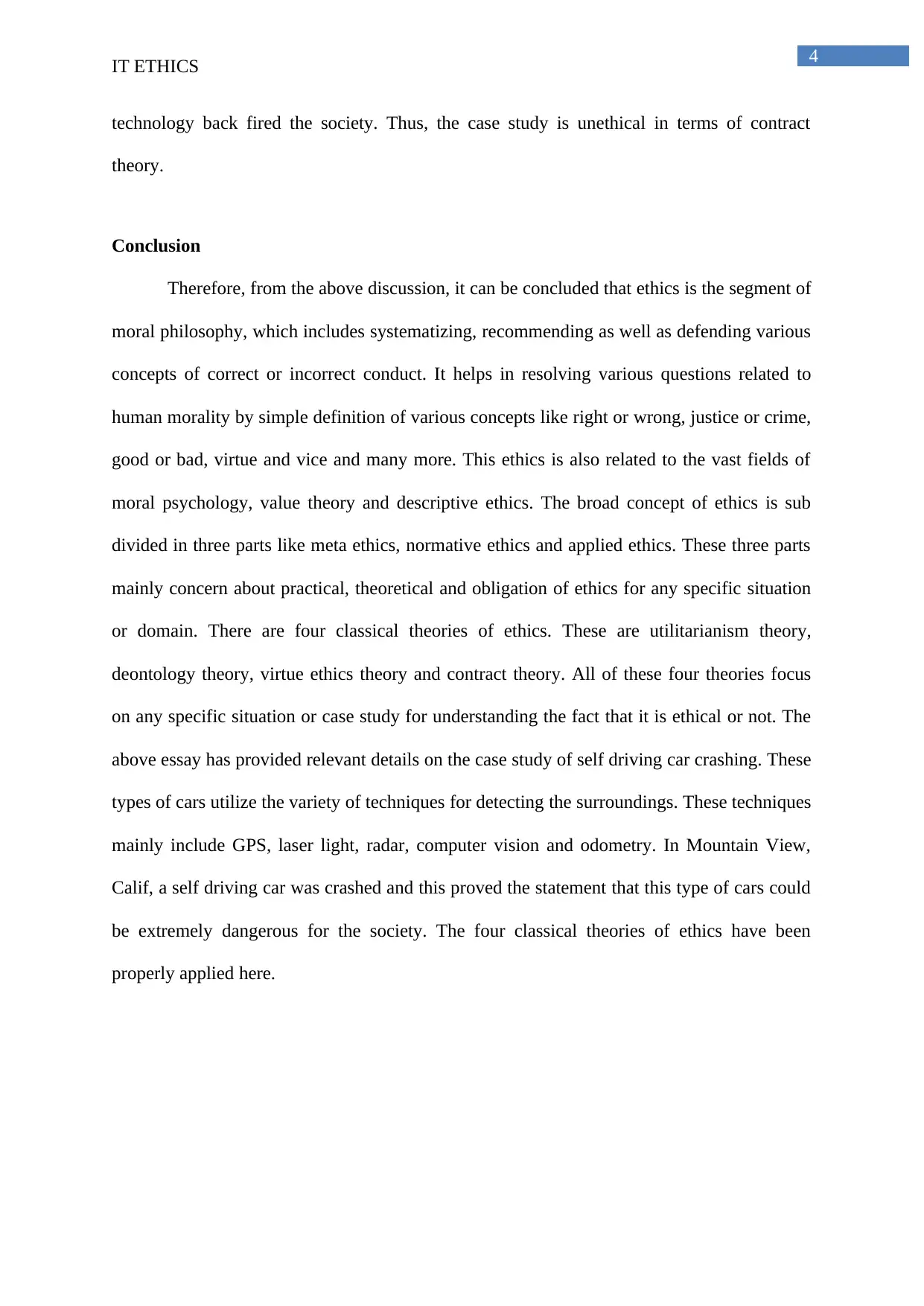
4
IT ETHICS
technology back fired the society. Thus, the case study is unethical in terms of contract
theory.
Conclusion
Therefore, from the above discussion, it can be concluded that ethics is the segment of
moral philosophy, which includes systematizing, recommending as well as defending various
concepts of correct or incorrect conduct. It helps in resolving various questions related to
human morality by simple definition of various concepts like right or wrong, justice or crime,
good or bad, virtue and vice and many more. This ethics is also related to the vast fields of
moral psychology, value theory and descriptive ethics. The broad concept of ethics is sub
divided in three parts like meta ethics, normative ethics and applied ethics. These three parts
mainly concern about practical, theoretical and obligation of ethics for any specific situation
or domain. There are four classical theories of ethics. These are utilitarianism theory,
deontology theory, virtue ethics theory and contract theory. All of these four theories focus
on any specific situation or case study for understanding the fact that it is ethical or not. The
above essay has provided relevant details on the case study of self driving car crashing. These
types of cars utilize the variety of techniques for detecting the surroundings. These techniques
mainly include GPS, laser light, radar, computer vision and odometry. In Mountain View,
Calif, a self driving car was crashed and this proved the statement that this type of cars could
be extremely dangerous for the society. The four classical theories of ethics have been
properly applied here.
IT ETHICS
technology back fired the society. Thus, the case study is unethical in terms of contract
theory.
Conclusion
Therefore, from the above discussion, it can be concluded that ethics is the segment of
moral philosophy, which includes systematizing, recommending as well as defending various
concepts of correct or incorrect conduct. It helps in resolving various questions related to
human morality by simple definition of various concepts like right or wrong, justice or crime,
good or bad, virtue and vice and many more. This ethics is also related to the vast fields of
moral psychology, value theory and descriptive ethics. The broad concept of ethics is sub
divided in three parts like meta ethics, normative ethics and applied ethics. These three parts
mainly concern about practical, theoretical and obligation of ethics for any specific situation
or domain. There are four classical theories of ethics. These are utilitarianism theory,
deontology theory, virtue ethics theory and contract theory. All of these four theories focus
on any specific situation or case study for understanding the fact that it is ethical or not. The
above essay has provided relevant details on the case study of self driving car crashing. These
types of cars utilize the variety of techniques for detecting the surroundings. These techniques
mainly include GPS, laser light, radar, computer vision and odometry. In Mountain View,
Calif, a self driving car was crashed and this proved the statement that this type of cars could
be extremely dangerous for the society. The four classical theories of ethics have been
properly applied here.
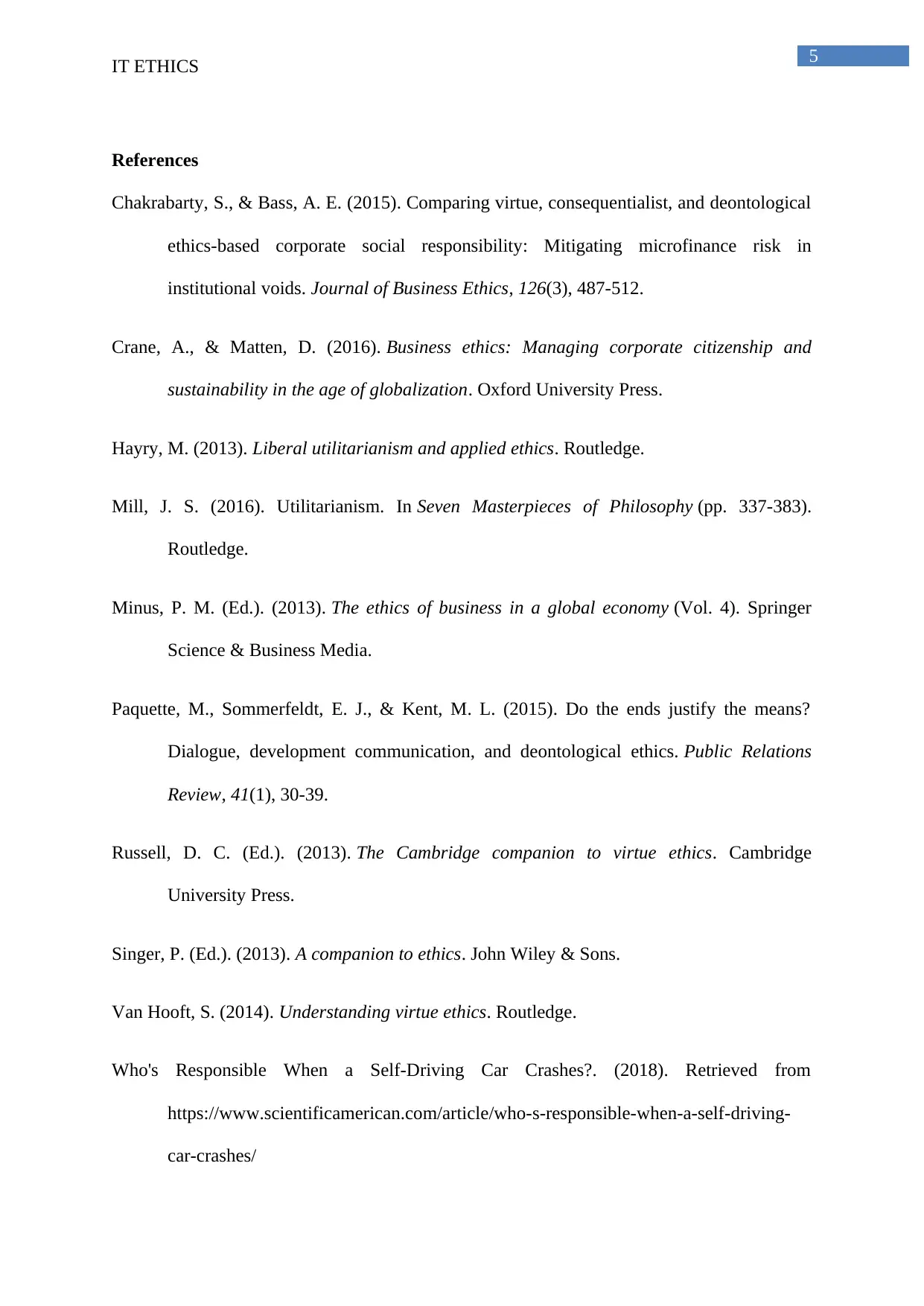
5
IT ETHICS
References
Chakrabarty, S., & Bass, A. E. (2015). Comparing virtue, consequentialist, and deontological
ethics-based corporate social responsibility: Mitigating microfinance risk in
institutional voids. Journal of Business Ethics, 126(3), 487-512.
Crane, A., & Matten, D. (2016). Business ethics: Managing corporate citizenship and
sustainability in the age of globalization. Oxford University Press.
Hayry, M. (2013). Liberal utilitarianism and applied ethics. Routledge.
Mill, J. S. (2016). Utilitarianism. In Seven Masterpieces of Philosophy (pp. 337-383).
Routledge.
Minus, P. M. (Ed.). (2013). The ethics of business in a global economy (Vol. 4). Springer
Science & Business Media.
Paquette, M., Sommerfeldt, E. J., & Kent, M. L. (2015). Do the ends justify the means?
Dialogue, development communication, and deontological ethics. Public Relations
Review, 41(1), 30-39.
Russell, D. C. (Ed.). (2013). The Cambridge companion to virtue ethics. Cambridge
University Press.
Singer, P. (Ed.). (2013). A companion to ethics. John Wiley & Sons.
Van Hooft, S. (2014). Understanding virtue ethics. Routledge.
Who's Responsible When a Self-Driving Car Crashes?. (2018). Retrieved from
https://www.scientificamerican.com/article/who-s-responsible-when-a-self-driving-
car-crashes/
IT ETHICS
References
Chakrabarty, S., & Bass, A. E. (2015). Comparing virtue, consequentialist, and deontological
ethics-based corporate social responsibility: Mitigating microfinance risk in
institutional voids. Journal of Business Ethics, 126(3), 487-512.
Crane, A., & Matten, D. (2016). Business ethics: Managing corporate citizenship and
sustainability in the age of globalization. Oxford University Press.
Hayry, M. (2013). Liberal utilitarianism and applied ethics. Routledge.
Mill, J. S. (2016). Utilitarianism. In Seven Masterpieces of Philosophy (pp. 337-383).
Routledge.
Minus, P. M. (Ed.). (2013). The ethics of business in a global economy (Vol. 4). Springer
Science & Business Media.
Paquette, M., Sommerfeldt, E. J., & Kent, M. L. (2015). Do the ends justify the means?
Dialogue, development communication, and deontological ethics. Public Relations
Review, 41(1), 30-39.
Russell, D. C. (Ed.). (2013). The Cambridge companion to virtue ethics. Cambridge
University Press.
Singer, P. (Ed.). (2013). A companion to ethics. John Wiley & Sons.
Van Hooft, S. (2014). Understanding virtue ethics. Routledge.
Who's Responsible When a Self-Driving Car Crashes?. (2018). Retrieved from
https://www.scientificamerican.com/article/who-s-responsible-when-a-self-driving-
car-crashes/
⊘ This is a preview!⊘
Do you want full access?
Subscribe today to unlock all pages.

Trusted by 1+ million students worldwide
1 out of 6
Related Documents
Your All-in-One AI-Powered Toolkit for Academic Success.
+13062052269
info@desklib.com
Available 24*7 on WhatsApp / Email
![[object Object]](/_next/static/media/star-bottom.7253800d.svg)
Unlock your academic potential
Copyright © 2020–2026 A2Z Services. All Rights Reserved. Developed and managed by ZUCOL.





